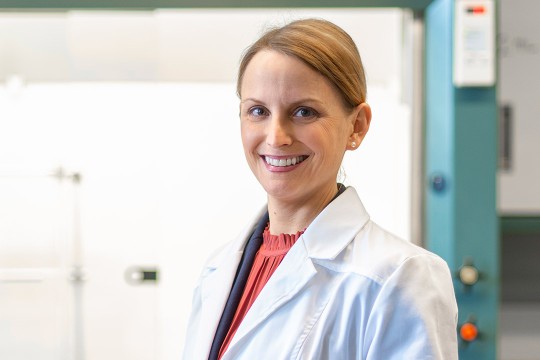News
Karin Wuertz-Kozak
-
February 24, 2025

Researchers explore how mechanical signals influence viral infections in lungs
The process combines virology and mechanobiology, two distinct areas of study that had not been explored at the same time but might prove to be a way to better understand disease progressions to intervene earlier and improve patient outcomes.
-
May 13, 2024

Mikkael Lamoca receives Fulbright scholarship to complete cutting-edge STEM cell research
Conducting hands-on research was a hallmark of the time Mikkael Lamoca ‘24 (biomedical engineering), ‘24 MS (science, technology, and public policy) spent at RIT. A Fulbright award presents him a new opportunity to conduct cutting-edge research at one of the top universities in Asia.
-
April 1, 2024

RIT faculty member becomes fellow of the American Institute for Medical and Biological Engineering
Becoming an AIMBE Fellow is one of the organization's most prestigious honors, representing the most accomplished individuals across academia, industry, education, clinical practice, and government.
-
September 1, 2023

RIT researchers pioneer solutions for degenerative disc disease and back pain
Researchers are improving non-invasive treatment options for degenerative disc disease, an ailment that impacts 3 million adults yearly in the U.S. Using state-of-the-art gene editing technology in mesenchymal stem cells, the researchers will add to the growing field of regenerative medicine, the process of producing cellular therapies to alleviate pain and lack of mobility.
-
March 22, 2023

RIT honors 14 researchers added to prestigious PI Millionaires group
RIT faculty members, who led research initiatives as principal investigators, were honored at a reception on March 21 to celebrate the individuals who helped the university reach record awards surpassing $92 million and place among the top private research universities in the country.
-
January 17, 2023

RIT researchers working on potential solution for back pain
WHAM-TV talks to Karin Wuertz-Kozak, professor in the Department of Biomedical Engineering, about her research on disc degeneration.
-
December 22, 2022

Leading spinal researcher develops new tissue regeneration approaches for back pain
Karin Wuertz-Kozak described her lab test equipment as a gym for cells. Stretching and compressions tests using bioreactors—her lab equipment—can make a difference in understanding how cells respond to mechanical cues and how that affects disease progression, specifically for spinal disc degeneration, common to millions of Americans.
-
October 20, 2022

Biomedical engineering researcher awarded grant to study chronic skin fibrosis
More collagen in the human body is not always good, and Professor Karin Wuertz-Kozak is investigating how disease progresses because of the increase in this important protein.


